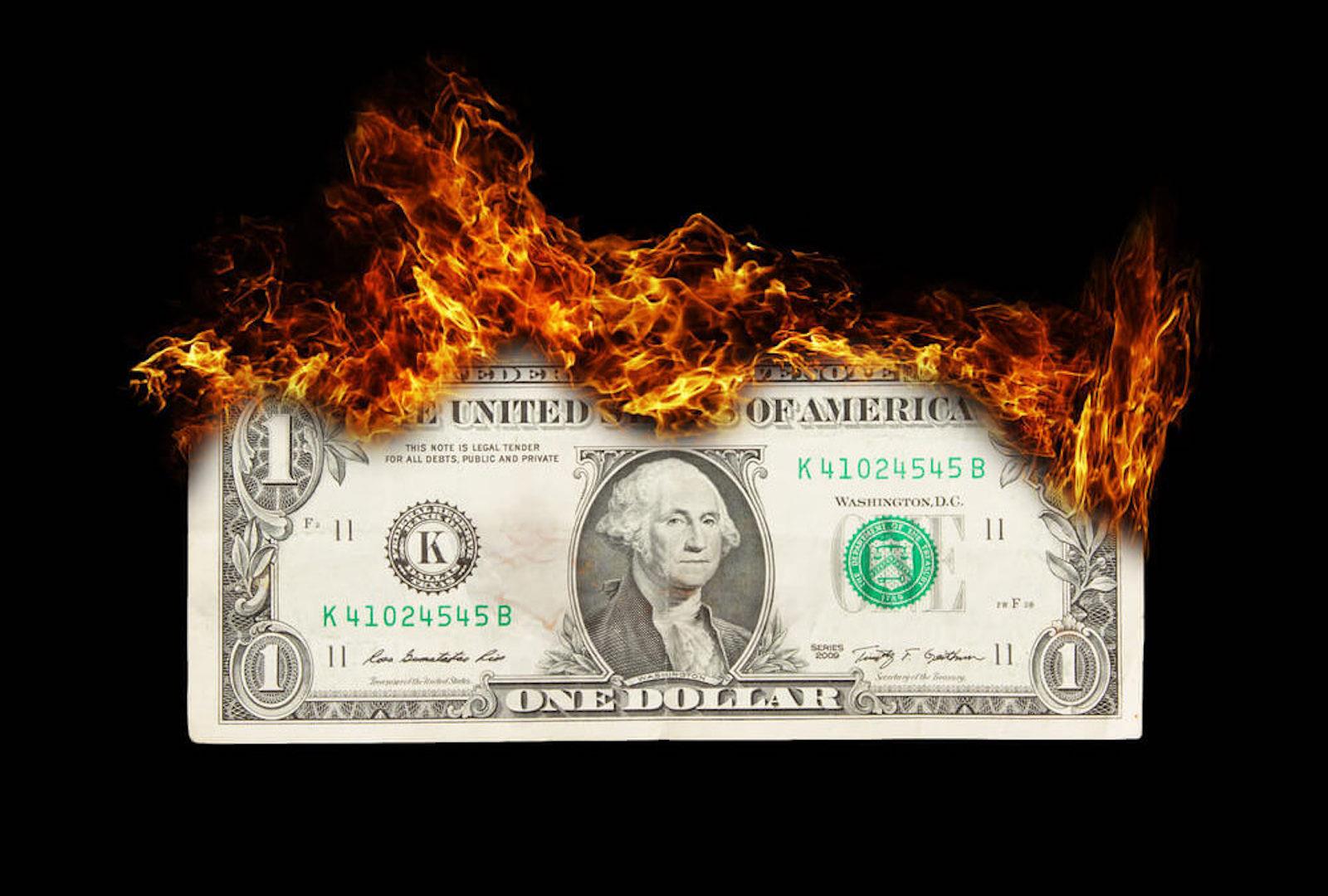Latest stories

US Navy can't hide its flagging fleet

Remembering Cambodia's genocide in a corner of Africa

Toward a China-checking Asian NATO Not that President Joe Biden's White House hasn't imperiled trust in the dollar. Along with continued debt accumulation, Team Biden's decision to freeze portions of Russia's currency reserves over its Ukraine invasion crossed a line with many global investors.
Economist Stephen Jen at Eurizon SLJ Asset Management notes that“exceptional actions” - including sanctions imposed by the US and its allies against Moscow - risk reducing the willingness of many nations to hold dollars.
Billionaire Ray Dalio, founder of Bridgewater Associates, agrees that the price of such tactics is that“there's less of an eagerness to buy” US Treasury securities.
On Tuesday (April 16), the International Monetary Fund tossed unusually harsh shade at American policymakers over continued fiscal misadventures.
“The exceptional recent performance of the United States is certainly impressive and a major driver of global growth,” the IMF said.“But it reflects strong demand factors as well, including a
fiscal stance
that is out of line with long-term fiscal sustainability.”
The IMF hit Washington's profligate tendencies, warning they risk exacerbating inflation and putting at risk the longer-term fiscal stability of the world's biggest economy.“Something will have to give,” the IMF concluded.
On top of Covid-19 stimulus, the Biden era has rolled out massive investments in clean energy, infrastructure and other policy priorities. Interest costs are rising as debt held by the public is on track to hit $45.7 trillion, or 114% of gross domestic product (GDP) by 2033. That compares with 97% at the end of 2023.
These dynamics explain why“debt debasement” trades have been“closing in on all-time highs,” observes Michael Hartnett, investment strategist at Bank of America.
In January,“Black Swan” author Nassim Nicholas Taleb warned of“a debt spiral.” Around that same time, former US Treasury Secretary Robert Rubin told Bloomberg the American economy is“in a terrible place” in the context of growth-debt dynamics.
Yet that was back when markets expected the US Federal Reserve to ease as many as seven times this year. Inflation trends have left Fed Chairman Jerome Powell's team on hold. In March, the consumer price index rose at a worse-than-forecast
3.5% annual rate.
Now, Iran's attack on Israel – and the specter of retaliation – threatens to send crude oil prices above $100 per barrel at a time when OPEC is determined to continue cutting production.
Fresh tensions in the Middle East risk adding additional upward momentum to commodity prices.
“Since Russia's invasion of Ukraine ... the world has now moved into an inflationary boom,” says Louis Gave, economist at Gavekal Dragonomics.“And in this inflationary boom, holding US dollars and US treasuries would prove costly for investors in general, and dangerous for investors from undemocratic countries.”
Gave adds“sure enough, since the invasion of Ukraine, the gold price has risen by a quarter and long-dated US treasuries have fallen by a third. This is interesting because for years before the Ukraine invasion, the two asset classes basically marched in lockstep with each other. But in the last two years, gold has acted as a portfolio diversifier – along with energy – in a way that US Treasuries have failed to do. Will the events of the weekend [Iran's bombing of Israel] change any of this?”
Enter Trump's devaluation gambit. No doubt such an idea would get extreme pushback from US institutions, including the Treasury, Fed and the Department of State.
The first Trump administration considered engineering a weaker dollar to boost American exports. In July 2019, Larry Kudlow, then-director of the National Economic Council, told CNBC that“just in the past week, we had a meeting with the president and the economic principles and we have ruled out any currency intervention . The steady, reliable dollar is attracting money from all over the world.”
That same month, Trump lashed out at China and Europe for, in his view, playing a“big currency manipulation game” and“pumping money into their system” to undermine American workers.
Trump argued then that Washington should employ the same strategy“or continue being the dummies who sit back and watch as other countries continue to play their games.”
Yet the dollar slid at the time amid worries Trump might get his way. It was plausible, considering Lighthizer had Trump's ear, along with advisor Peter Navarro, an economist advocating protectionist policies.
In July 2019, all this prompted then-US finance minister Steven Mnuchin to head to microphones to declare:“I am not going to advocate a weak dollar policy near term as the Treasury Secretary.”
Today, an argument can be made that a chronically overvalued dollar comes with costs.
Economist Mohamed El-Erian, president of Queens' College, Cambridge, tells Bloomberg that“authorities are a little bit frozen around the world as to how do you react to a generalized dollar strengthening? How do you react to a generalized increase in interest rates in the US?”
El-Erian adds that“unfortunately in the past, when those two things go too far, they break something elsewhere.”
Trump might break far more by effectively pouring sugar in the dollar's fuel tank. Any resulting surge in borrowing costs would vastly increase Washington's debt-servicing burden and leave less money for vital services. And investments aimed at increasing innovation and productivity.

The dollar's days as the world's reserve currency could be numbered if Trump has its way. Image: Twitter / Screengrab

Sign up for one of our free newsletters The Daily ReportStart your day right with Asia Times' top stories AT Weekly ReportA weekly roundup of Asia Times' most-read stories
It would also precipitate history's biggest currency war as China , Japan and developing Asia scramble to cap exchange rates. First, Tokyo, Beijing and other top foreign holders of US debt would reduce their exposure. The race to front-run dollar sales would see Asian central banks potentially dumping $3 trillion-plus worth of US Treasuries.
Aside from the initial financial chaos and lost respect, a dollar devaluation would warp incentives for the entire US economy. Again, if a weak currency were a magical policy, Japan's GDP wouldn't be nearly $1 trillion smaller than it was a dozen years ago.
In Japan's case, 25 years of prioritizing a weak yen over retooling growth engines undermined competitiveness. It meant that the 12 governments that led the nation since 1998 had little urgency to reduce red tape, loosen labor markets, launch a startup boom, increase productivity and empower women. And it
took the onus off corporate CEOs to restructure, innovate and take risks.
A Trump 2.0 presidency could put the US on a similar path toward mediocrity. It might fulfill his dream of dragging the US back to 1985, an era when top-down tariffs could alter economic playing fields in powerful ways. The same was true of sharp exchange-rate shifts.
Take the events of 1985 at New York's Plaza Hotel, which Trump once famously owned. It was there in what became known as the Plaza Accord that the US bulldozed then-archrival Japan and Europe to weaken the dollar, boost the yen and give Washington something approaching the zero-sum benefits Trump figures should be his for the taking.
In the 40 years since, China replaced Japan as the target of Trump's ire. When Trump complained during his 2017-2021 presidency that China was“raping” US workers, it echoed his anti-Japan tirades of the 1980s. Yet the economic system that Trump craves to time travel to no longer exists.
In 1985, top economic powers could hold sway with currency markets and alter trajectories decisively. Today, China has ample ways to navigate around Washington's policies, meaning if Trump wins in November and seeks to devalue the dollar it would be a policy mishap of epic proportions.
Follow William Pesek on X at @WilliamPesek
Already have an account?Sign in Sign up here to comment on Asia Times stories OR Thank you for registering!
An account was already registered with this email. Please check your inbox for an authentication link.